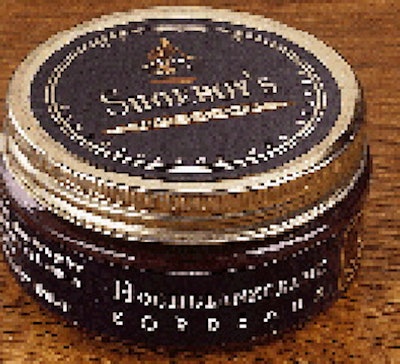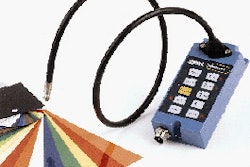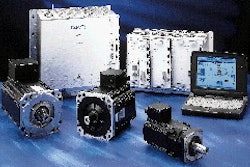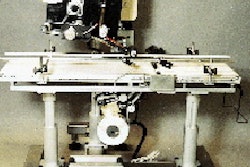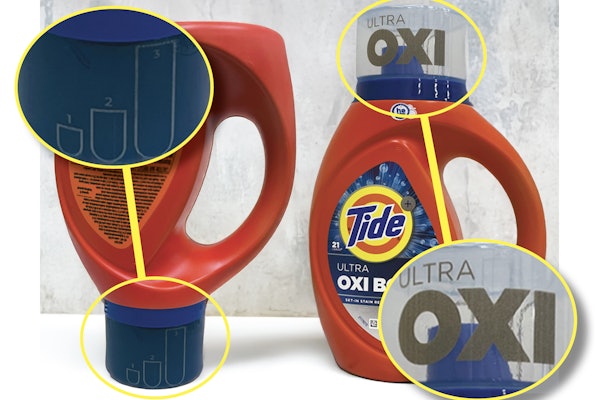The triennial show in Birmingham, U.K., took place March 30-April 3. The clickable deodorant is Sure Ultra Dry Cream. U.K.'s London-based Elida Faberge markets the brand in a package featuring a toggle switch at the bottom of the face panel. Depressing the toggle engages a sprocket in the base that, in turn, revolves and pushes the deodorant platform upwards, dispensing the deodorant. Structural designer John Lamb from Tin Horse (Marlborough, Wiltshire, U.K.) explains that traditional actuating devices, such as bottom twists and push ups, could not offer the type of control necessary for this cream deodorant. A challenge existed, according to Lamb, because the cream deodorant contains silicone, which has a tendency to leak out of the package if the contents are not controlled appropriately. (Cream deodorants were new to the U.K. market at the time of launch last year.) The successful solution-a nine-piece assembly-is being manufactured by Wiko (Exton, PA), a supplier of dispensing systems that is based in Germany. PET houses polish, mayo The latest in "hochglanzcreme" (or high-gloss cream) shoe polish packaging comes from Germany. A 100-mL (3.38-oz) jar made of polyethylene terephthalate by PET Power (Etten Leur, the Netherlands) replaces the squat metal container traditionally associated with shoe polish. The transparent PET container (topped by a decorated continuous-thread metal closure) allows consumers to view the polish color without opening. On the market since last fall, the product is being marketed under the Shoeboy brand by Solitar (a div. of Merck). PET Power's Managing Director Kees Killestijn says that the packager is hoping to achieve a three-year shelf life. Another achievement displayed by PET Power is a wide-mouth PET mayonnaise application in two sizes. Sweden's Kavli brand is now available in 370 and 525 grams (13 and 18.5 ounces, respectively). The containers are sealed with metal lug closures. A new linerless, pressure-sensitive label was unveiled by SE Labels Group (Cheshire, England). Although the company would not disclose adhesive specifics, the formulation allows p-s labels to be stacked without adhering to each other. The labels work in tandem with labeling equipment, also from SE, that can apply at speeds to 200/min. The labels and equipment are represented in the U.S. by Fresh Ideas Packaging Systems (Sewickley, PA). Lamination deters shoplifting Safta S.p.A. (Piacenza, Italy) debuted a lamination with an anti-theft device. The structure incorporates an electronic article surveillance device in the form of metallic wire filament to deter shoplifting. The flat filament is approximately 1-mm wide and cannot be removed from the plastic film sandwich without destroying the package. Although inclusion of the filament adds slightly to the cost of the lamination, it eliminates the need to apply secondary devices at retail. The firm says the lamination is ideal for pouch applications holding pricier goods such as coffee or gourmet foods. Currently, an Italian biscotti producer is evaluating the structure. Also on the drawing board from Safta is more-advanced technology that substitutes metallic ink for the metallic filament. Mystery coating Rockwell Solutions Ltd. (Dundee, Scotland) was promoting its new Rockbarrier film with Clearbar coating as having the "highest gas barrier available." Although unwilling to disclose specifics about Clearbar, Rockwell's Granada, Spain-based export manager Alvaro Alvarez Y Alvarez says Clearbar, like ethylene vinyl alcohol, must be shielded from moisture by sandwiching it in laminations. Clearbar structures are said to be priced below comparably performing EVOH alternatives. According to Alvarez, a lamination of 12-micron (1/2-mil) polyester/1.5-micron (0.06-mil) Clearbar has an OTR of 0.33 cc/sq m/day at 23°C and 75% RH; a lamination of 12-micron metallized PET/1 micron (0.04-mil) Clearbar has an OTR of 0.12cc under the same conditions. In both cases, the Clearbar lamination would take a third layer of the packager's own choosing. Rockwell also points out that the technology was developed in answer to the growing environmental concern in Europe over the use of materials containing chlorine, including polyvinylidene chloride. Rockbarrier is available in the U.S. from Green-Tek (York, PA).
